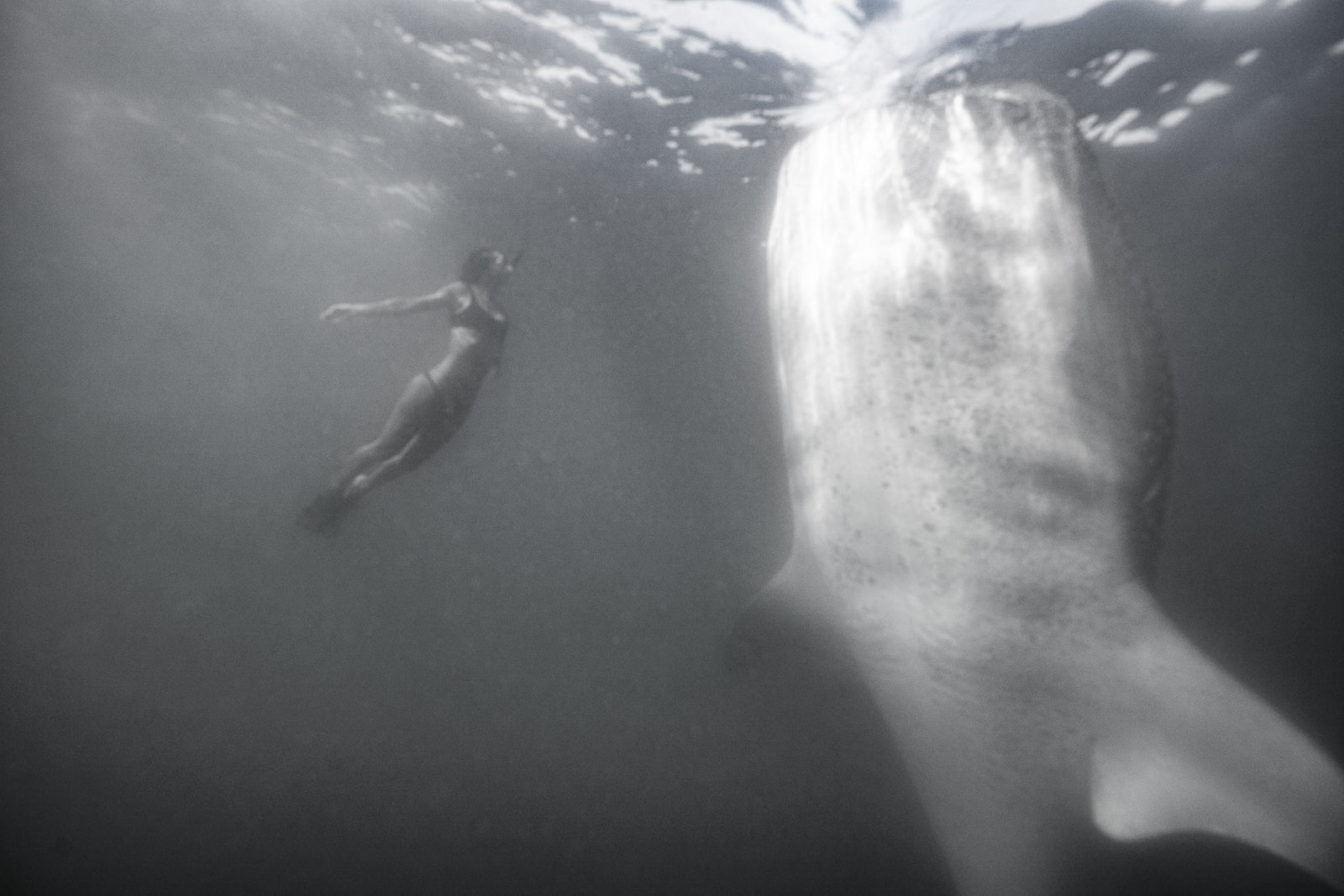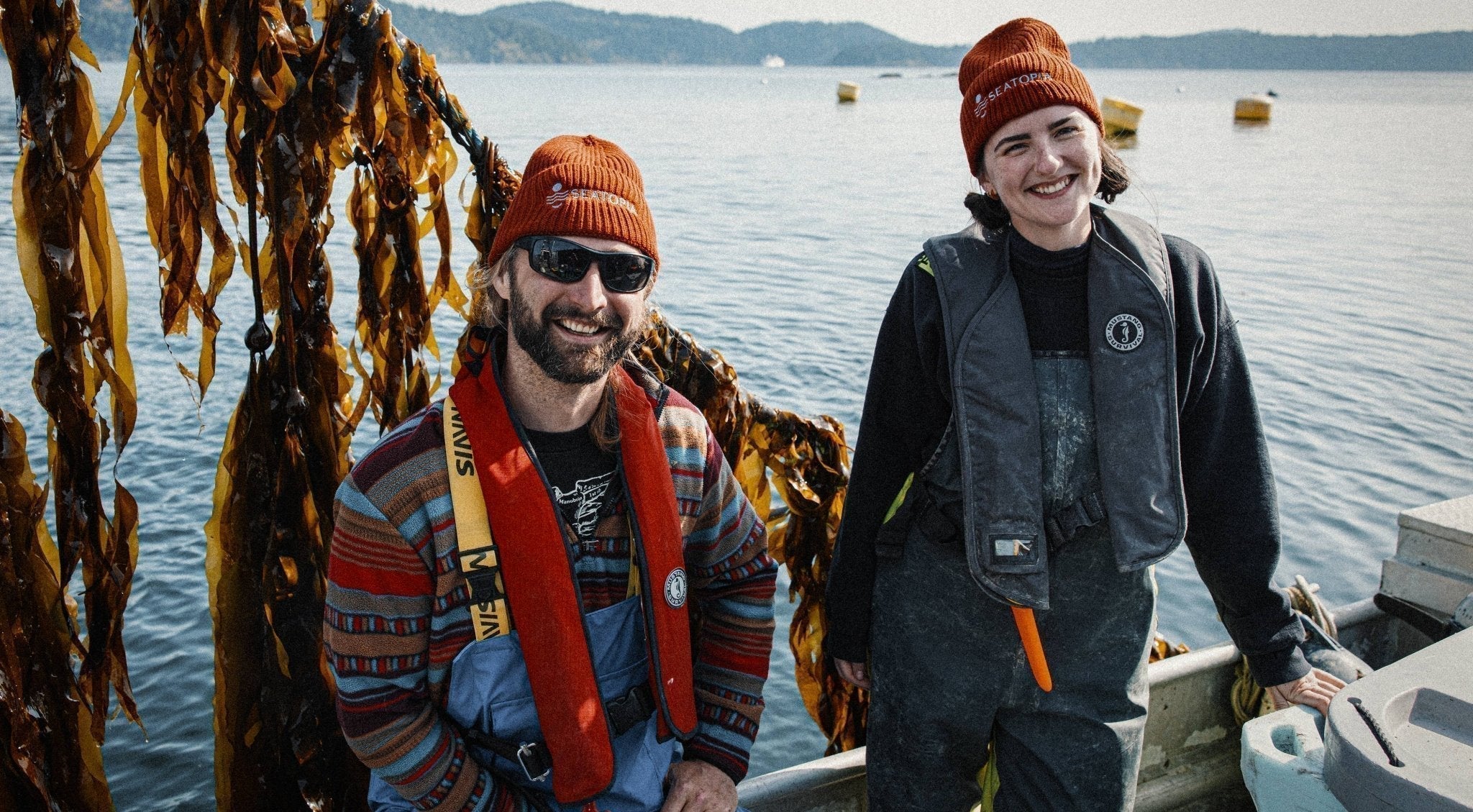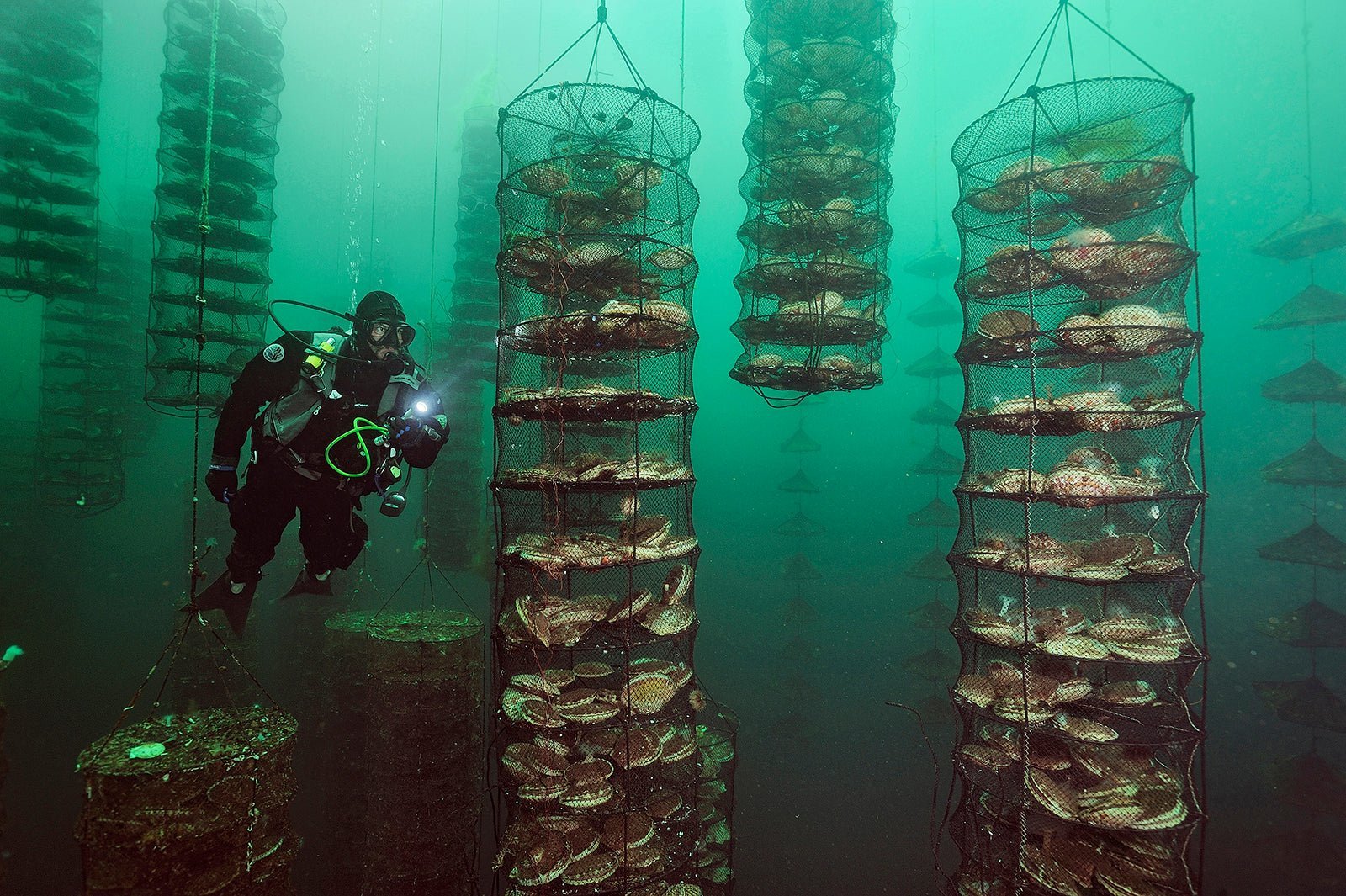 Seatopia co-founder Daniella Smith freediving with a female whale shark in the Sea of Cortez. Photo by co-founder James Arthur Smith.
Seatopia co-founder Daniella Smith freediving with a female whale shark in the Sea of Cortez. Photo by co-founder James Arthur Smith.
Freediving alongside a gentle giant like a whale shark is an awe-inspiring experience that transcends words. In those moments, submerged in the ocean’s rhythm, you feel truly alive—your senses sharpen, your mind clears, and your connection to life itself deepens. The ocean gives us this vitality, and it’s no coincidence that omega-rich seafood does the same, nourishing us on a cellular level.
When we eat seafood rich in DHA and EPA, we unlock the nutrients that have fueled human evolution for millennia. These essential omega-3 fatty acids are not just brain food—they are foundational for optimal health, supporting mental clarity, longevity, and resilience. Science tells us what our ancestors inherently knew: seafood is humanity’s original super nutrient.But to honor this gift, we must do so in harmony with the ocean—protecting wild species and ensuring the experiences of awe and connection, like swimming with a whale shark, endure for generations to come.
This is why we founded Seatopia: to restore the broken relationship between people and the sea by providing direct access to certified clean, regenerative seafood that nourishes both humanity and the planet.Let’s make seafood healthy again—not just for ourselves, but for the ecosystems that sustain us.
Aquatic Ape Hypothesis
What if our ancestors weren’t the hunters of the savanna you’ve always imagined? The Aquatic Ape Hypothesis suggests something far more fascinating (and relatable): early humans thrived by the sea, gathering shellfish, wading tidepools, and unlocking the ocean’s greatest gift—DHA-rich seafood, the ultimate brain fuel. 🧠✨
🐟 Savanna vs. Sea: Forget chasing mammoths on the grasslands. Coastal foraging offered reliable, nutrient-dense food—protein, Omega-3s, and everything needed to grow the complex human brain. Did we owe our evolution to the shoreline instead of the savanna?Could it be that our bodies are still, in a sense, adapted for life by the sea?
Anthropologists have long debated the Aquatic Ape Hypothesis—the theory that some of our ancestors lived near coastlines, relying on the ocean’s rich resources to fuel their evolutionary journey. This theory offers fascinating insights into why humans, unlike most land mammals, possess certain aquatic traits. For instance, when free diving we exploit the "Mammalian Dive Reflex"—which instinctively lowers heart rate and conserves oxygen when humans submerge in water—is an instinct we share with marine mammals. This reflex, along with other adaptations like salt excretion glands and partial webbing between our fingers, may point to a time when our survival and development were intimately tied to the ocean.
At Seatopia, we believe that embracing our aquatic origins can have profound effects on our modern health. Omega-3-rich seafood may have been the fuel behind early brain development, setting humans apart with higher cognitive abilities.
In America's shift to industrialized food systems, we’ve lost touch with the nutrient-dense diets that once fueled human evolution. Seatopia’s mission is to bring those critical nutrients back, restoring balance to both human health and the ocean. Today, returning to seafood in its most natural, bioavailable form—raw—allows us to honor those evolutionary roots, nourishing our bodies and brains with the same nutrients our ancestors thrived on.
John F. Kennedy once said,
“We are tied to the ocean. And when we go back to the sea, whether it is to sail or to watch it, we are going back from whence we came.”
This sentiment resonates not only with our emotional connection to the sea but also with the biological truth of our dependence on it for life. Our relationship with the ocean runs deeper than its beauty or mystery; it is woven into the very fabric of our evolution and survival.
Seafood: Humanity’s Original Super Nutrient
The Evolutionary Edge: Why Seafood Shaped Human Brain Development
Our evolutionary history points to seafood as one of the most vital components in early human diets, thanks to its abundance of omega-3 fatty acids, particularly DHA (docosahexaenoic acid) and EPA (eicosapentaenoic acid).
While some theories of human evolution focus on early humans as hunters of large mammals on open grasslands, the Aquatic Ape Hypothesis presents a more compelling and sustainable story. This theory suggests that coastal-dwelling human groups—possibly led by matriarchal societies—spent much of their time gathering shellfish, wading in tidepools, and foraging in estuaries.
These activities provided a consistent, nutrient-dense food source rich in protein, DHA, and other essential fatty acids. Unlike large-game hunting, which required risk, extensive physical exertion, and luck, coastal foraging offered a steady and reliable source of food.
Anthropological findings suggest that this access to protein and omega-3s was crucial to the rapid growth and complexity of the human brain. DHA, a primary component of brain tissue, supports synaptic plasticity—the adaptability of neurons that enables learning, memory, and advanced cognitive functions. By gathering and consuming shellfish, early humans tapped into a nutritional resource that likely shaped the evolution of higher intelligence.
Why DHA and EPA Are Essential Fatty Acids
Omega-3 fatty acids, including DHA and EPA, are classified as essential fatty acids because the human body cannot efficiently produce them on its own. Despite their importance, evolution left us dependent on obtaining these nutrients from our diet—a fascinating paradox for such a critical biological need. These fatty acids are not just beneficial; they are vital to the proper functioning of several key systems in the body.
DHA in Brain Development: DHA is found in particularly high concentrations in the cortex, the part of the brain responsible for memory, attention, perception, and thought. This makes DHA indispensable for cognitive functions and the development of higher intelligence.
DHA in Breast Milk: DHA is also abundant in breast milk, reflecting its importance for infant brain and nervous system development. This natural provision ensures that newborns receive the essential building blocks needed for rapid brain growth in the early stages of life.
DHA in Eye Health: Another remarkable concentration of DHA is found in the retina of the eye, where it plays a critical role in maintaining vision and supporting the health of photoreceptor cells. This connection highlights DHA’s importance in both sensory and neurological systems.
The need for these fatty acids, coupled with our inability to synthesize them effectively, underscores the evolutionary significance of diets rich in omega-3s. For early humans, seafood provided an abundant, reliable source of these nutrients, cementing its role in shaping the trajectory of our development.
Coastal Migration: Following the Nutrient-Rich Shorelines
The connection between humans and the sea extends beyond food. Evidence from anthropological studies shows that early humans migrated out of Africa by following the coastlines, taking advantage of the consistent supply of shellfish and other seafood. These coastal pathways provided abundant access to healthy nutrients, particularly omega-3 fatty acids, and allowed populations to expand into new regions without the uncertainties of terrestrial hunting. This reliance on the shoreline highlights a probable evolutionary scenario where female-led groups played a significant role in ensuring the survival of their communities by foraging in tidepools and estuaries. Shellfish, seaweed, and fish offered not only sustenance but also a competitive edge for human development, as the omega-3s in seafood supported brain growth, improved neural function, and enhanced social and problem-solving abilities.
DHA: A Molecular Superconductor
The Aquatic Ape Hypothesis suggests that coastal-dwelling early humans relied on seafood to access DHA, a key omega-3 fatty acid that may have accelerated brain evolution. DHA is more than just a nutrient—it’s a unique molecular superconductor that optimizes the electrical and metabolic efficiency of the brain and nervous system. Its structure makes it extremely flexible, creating cell membranes that are both fluid and highly conductive to electrical signals. This molecular flexibility was likely crucial for early brain development, allowing for the rapid and efficient transfer of signals in the brain. DHA enables faster, more efficient signaling, allowing brain cells to communicate quickly and seamlessly. In a way, DHA may have given our ancestors an evolutionary advantage, helping the brain to grow in size and complexity over time.
A New Perspective on Evolutionary Nutrition
The idea of early humans as coastal foragers, rather than primarily big-game hunters, reframes our understanding of how nutrition shaped human evolution. By relying on a steady and abundant supply of seafood, early humans ensured their brains were well-nourished with DHA and EPA—nutrients that are still essential for modern health. This connection between the ocean and human survival is a powerful reminder of how deeply tied we are to our aquatic origins.
Today, eating seafood isn’t just a way to honor those roots—it’s also a way to reconnect with the nutrients that have supported human health and intelligence for millennia. The same DHA that fueled the growth of our ancestors’ brains is still vital for maintaining cognitive sharpness and supporting neurological health today. It’s no coincidence that seafood, rich in this essential fatty acid, remains one of the best choices for brain health.
As JFK so eloquently put it, when we go back to the sea, we’re returning to a place that shaped our past and continues to sustain us. By consuming clean, sustainably sourced seafood like Seatopia’s sushi-grade offerings, we can nourish our bodies and minds just as our ancestors once did.
Omega-3 Fatty Acids: The Benefits of EPA and DHA for Health and Longevity
Omega-3 fatty acids are essential for numerous aspects of health, including cardiovascular function, inflammation reduction, and neurological support. While the body can synthesize some nutrients, omega-3s must be consumed through diet, highlighting the importance of including seafood in our meals.
Functional Benefits of Omega-3s
Cardiovascular Health: Omega-3s help reduce blood pressure, lower triglycerides, and prevent arterial plaque formation, lowering the risk of heart disease and stroke. Additionally, they possess anti-inflammatory properties that protect against chronic illnesses.
Neurological Benefits: DHA is a structural powerhouse in the brain and retina, supporting cognitive functions like memory and performance. Omega-3s are linked to reduced risks of neurodegenerative diseases, including Alzheimer’s, and support brain development in infants.
Anti-Inflammatory Effects: EPA and DHA help reduce the production of inflammatory molecules and cytokines, making them effective in managing inflammatory conditions like arthritis, asthma, and even inflammatory bowel disease. Omega-3 fatty acids are powerful tools in the fight against aging, reducing inflammation and protecting against chronic diseases like heart disease and arthritis.
Physical Performance: For athletes and active individuals, seafood rich in omega-3s offers essential support for muscle recovery, joint health, and sustained energy.
These nutrients are as vital now as they were to our ancestors wading in tidepools.
Brain Fuel and Energy Transfer
DHA is also essential for the energy demands of the brain, which uses about 20% of the body’s energy despite its small size. DHA in mitochondrial membranes helps produce ATP, the energy currency of our cells, with greater efficiency. By supporting optimal energy transfer, DHA sustains the brain’s high energy needs, helping us to think, react, and remember. This unique role of DHA in energy transfer not only supports cognitive health but has also protected the human brain from oxidative stress, a benefit that may reduce the risk of neurodegenerative diseases as we age.
Seatopia: Fostering the Cultivation of Better Seafood to Make Seafood Healthy Again
At Seatopia, our mission goes beyond simply providing seafood—we are dedicated to fostering the cultivation of healthier seafood that prioritizes both human health and environmental sustainability. By partnering with farms that utilize microalgae-based oils and insect protein feeds, we’re not only cultivating healthier seafood but also reducing the environmental footprint of aquaculture. Our regenerative aquaculture farm partners are setting a new standard for seafood that is not only cleaner and safer but also higher in omega-3 fatty acids like EPA and DHA. Our commitment ensures direct access to the cleanest, most bioavailable seafood, delivering unparalleled nutrition in every bite.
Here’s a breakdown of the average EPA and DHA content in two of Seatopia’s favorite products and how they compare to often sited wild fish sources and how they compare to fish oil supplements:
| Nutrient (per 6 oz) | Esteros Lubimar Branzino | Caleta Bay Steelhead | Wild King Salmon* | Wild Bigeye Tuna* | Omega-3 Supplements* (Ethyl Ester) |
|---|---|---|---|---|---|
| Omega-3 Fatty Acids | 2,822 mg | 1,904 mg | ~1,500 mg | ~1,360 mg | ~1000 mg |
| Bioavailability | High (Triglyceride form) | High (Triglyceride form) | High | High | Lower (Ethyl Ester form) |
*Compared to the commonly published wild-caught fish test results by the FDA and most fish oil supplements, the specific Seatopia farms highlighted above demonstrate higher total omega-3 content in lab tests. Moreover, they deliver omega-3s in their natural triglyceride form, which is significantly more bioavailable and easier for the body to absorb than the ethyl ester form commonly found in many supplements.
Building a Regenerative, Nutrient-Rich Food Chain
At Seatopia, our mission extends beyond health benefits. We work with regenerative aquaculture farms to ensure that our seafood is not only nutritious but also harvested in a way that supports ocean ecosystems.
Our farm partners use microalgae-based oils and insect protein feeds, which are rich in EPA and DHA, to raise seafood that’s both environmentally friendly and nutrient-dense. This approach aligns with our belief that seafood can be both a functional superfood and a regenerative force for the planet.
Furthermore by integrating kelp farming alongside fish aquaculture, regenerative systems create ‘underwater forests’ that absorb carbon and nitrogen, reversing the effects of ocean acidification while providing habitat for diverse marine species. Our farm partners like, Esteros Lubimar operates like a natural estuary, attracting hundreds of species of birds and fish while cultivating seafood that is nutrient-dense and delicious. This approach demonstrates how regenerative aquaculture can enhance biodiversity while producing healthy food. Every pound of fish cultivated through regenerative aquaculture represents a pound of wild fish that remains in the ocean, allowing ecosystems to recover and thrive.
Let’s Make Seafood Healthy Again
America’s seafood supply chain is broken. It commoditizes sea life, prioritizing quantity over quality, and lacks transparency about toxins like mercury and microplastics. It’s a system that reduces the profound nutritional power of seafood to a simple price per pound, ignoring what truly matters: the price per bioavailable milligram of nutrients that nourish our bodies and fuel our minds. But our connection to seafood runs far deeper than the grocery aisle.
From our aquatic origins, where coastal-dwelling ancestors thrived on nutrient-dense seafood, to the mermaid-like instincts encoded in our Mammalian Dive Reflex, seafood has always been more than food—it’s been a lifeline to survival, evolution, and higher cognition.
DHA, the original brain fuel, played a critical role in shaping our human potential, and it’s just as essential for us today. At Seatopia, we’re on a mission to honor this heritage by fixing America's broken seafood system. By fostering the cultivation of cleaner, healthier, and more regenerative seafood, we’re reconnecting with the ocean’s promise and delivering its benefits straight to your table. We’re not just making seafood better—we’re reclaiming the health and vitality that fueled our evolution.
Join Seatopia in creating a healthier future for seafood and humanity. By choosing clean, regenerative seafood, you’re not just nourishing yourself—you’re helping heal our oceans and redefine what seafood can be. Let’s make seafood healthy again.
Discover Seatopia’s clean, omega-3-rich offerings and reconnect with the nutrients that helped make us who we are. Start your journey back to the sea today.











Share:
What Do Buffalo And Fish Have In Common?
61 Full Moons to 2030: Protecting Our Oceans with the 30x30 Campaign